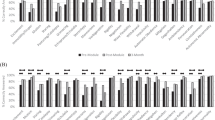Abstract
The Milestones Project, like all previous systems and changes in graduate psychiatric education, for example, moving from 3 to 4 years of training or adopting six competency domains, has been devised without any supporting data and does not assess meaningful outcomes, such as improved patient outcomes. No evidence is presented that Milestones-based training will produce better psychiatrists. There is a path forward. First, replace unproven expert consensus with scientific and evidence-based approaches. Second, exchange endpoints that are easy to assess but uncorrelated with real world functioning (e.g., multiple-choice examinations) for outcomes that are meaningful and external to the training program (e.g., patient outcomes). Finally, to prevent possible waste, excess burden, or harm, no changes should be mandated until proven in prospective studies.
Similar content being viewed by others
References
Nasca TJ, Philibert I, Brigham T, et al.: The Next GME Accreditation System — rationale and benefits. NEJM 2012: 1–6.
Beresin E, Balon R, Coverdale J. The Psychiatry Milestones: new developments and challenges. Acad Psychiatry. 2014;38:249–52.
www.acgme.org/acgmeweb/Portals/O/PDFs/Milestones/PsychiatryMilestones.pdf ; November 2013.
Hollender MH, Kaplan EA. Psychiatry as part of a mixed internship. A report based on five years of experience. Arch Gen Psychiatr. 1965;12:18–22.
Leach DC. The ACGME competencies: substance or form? J Am Coll Surg. 2001;192:396–8.
Magen J, Richards M, Ley AF. A proposal for the “Next-Generation Psychiatry Residency”: Responding to Challenges of the Future. Acad Psychiatry. 2013;37:375–9.
Golub R. Medical education theme issue 2014. Editorial. JAMA. 2014;311:918.
Cooke M, Irby D, O’Brien B: Educating physicians: a call for reform of medical school and residency. Jossey- Bass, 2010
Norcini JJ, Boulet JR, Dauphinee WD, et al. Evaluating the quality of care provided by graduates of international medical schools. Health Aff. 2010;29:1461–8.
Nasca T, Weiss K, Bagian JP, et al. The accreditation system after the "next accreditation system". Acad Med. 2014;89:27–9.
Asch DA, Nicholson S, Srinivas S, et al. Evaluating obstetrical residency programs using patient outcomes. JAMA. 2009;302:1277–83.
Fazio SB, Papp KK, Torre DM, et al. Grade inflation in the internal medicine clerkship: a national survey. Teach Learn Med. 2013;25:71–6.
Carter W: Milestone myths and misperceptions. J Grad Med Ed 2014 March 18–20.
Norman G, Norcini J, Bordage G: Competency- based education: milestones or millstones? J Grad Med Ed 2014, March, 1–6.
Dewan M, Manring J, Satish U: The Milestones Hypothesis. J Grad Med Ed (in press)
Carraccio C, Englander R. Evaluating competence using a portfolio: a literature review and web-based application to the ACGME competencies. Teach Learn Med. 2004;16:381–7.
Satish U, Manring J, Gregory R, et al. Novel assessment of psychiatric residents: SMS simulations. ACGME Bulletin. 2009;1:18–23.
Krishnamurthy S, Satish U, Foster T, et al. Components of critical decision making and ABSITE assessment: toward a more comprehensive evaluation. J Grad Med Educ. 2009;1:273–7.
ten Cate O. Entrustability of professional activities and competency-based training. Med Educ. 2005;39:1176.
www.acgme.org/acgmeweb/Portals/O/PDFs/Milestones/InternalMedicineMilestones.pdf; 2012.
Englander R, Cameron T, Ballard A, et al. Toward a common taxonomy of competency domains for the health professions and competencies for physicians. Acad Med. 2013;88:1088–94.
Kaplan R, Satterfield J, Kington R. Building a better physician—the case for the new MCAT. NEJM. 2010;366:1265–8.
Disclosure
Dr. Dewan has received a grant funded by the Health Resources and Services Administration (HRSA) and receives royalties from American Psychiatric Press, Inc.; John Wiley; and Taylor & Francis Group, LLC. He serves as a consultant to Streufert Consulting, LLC.
Dr. Satish has received grants funded by Syracuse University/Center of Excellence/EPA and serves as a consultant to Streufert Consulting, LLC.
Author information
Authors and Affiliations
Corresponding author
Rights and permissions
About this article
Cite this article
Dewan, M., Manring, J. & Satish, U. The New Milestones: Do We Need to Take a Step Back to Go a Mile Forward?. Acad Psychiatry 39, 147–150 (2015). https://doi.org/10.1007/s40596-014-0213-9
Received:
Accepted:
Published:
Issue Date:
DOI: https://doi.org/10.1007/s40596-014-0213-9




